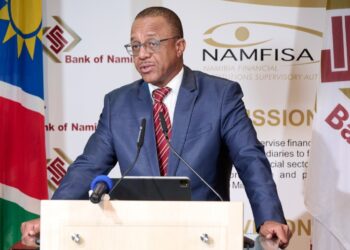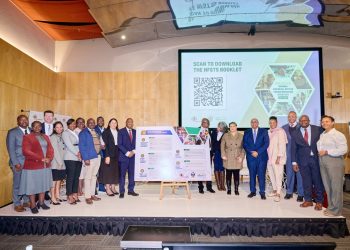
Standard Bank Namibia, which is participating at the 2022 United Nations Climate Change Conference (COP27), says it actively supports Namibia’s transition to a low-carbon economy.
The listed lender said it also supports efforts to mitigate the impact of climate change, and improve access to reliable and sustainable energy sources, a critical factor in Namibia’s economic growth and poverty alleviation.
“We continue to partner with clients and stakeholders to support their climate transitions and national climate commitments,†said Standard Bank Namibia Head Treasury and Capital Management , Danie Rourke who is part of the delegation led by Chief Executive, Mercia Geises.
He said the country’s plans to implement green hydrogen initiatives will positively contribute to the energy transition, supported by tailor made funding solutions offered by the bank.
“Standard Bank believes Green Hydrogen will play a role in the energy transition alongside other technologies and is positioning itself to respond to the growing number of opportunities.We have become involved early and are working with all key stakeholders and clients to assess progress on the various projects in Namibia and the region. The sector has progressed to the point where risks are better understood and Standard Bank is working towards refining funding terms for these complex projects as they move towards bankability,†Rourke told The Brief.
Commenting on the bank’s capacity to fund such huge projects, Rourke said: “Standard Bank is leveraging its networks to cover off interest in the region for Green Hydrogen in Europe and the East. Locally, Standard Bank sees the importance and continues to upskill our people for future readiness including sustainable finance knowledge and skills to ensure the necessary capacity and capabilities exist in the long run.â€
The bank’s position is inline with Standard Bank Group’s commitment to achieving a net zero portfolio by 2050 and provide renewable energy and sustainable finance in the next three years.
“As a Group, Standard Bank has committed to achieving a net zero portfolio by 2050, has set specific climate targets in carbon-intensive sectors and has committed to renewable energy and sustainable finance in the next three years. Our Namibian sustainability journey over the past few years includes the following key milestones,†he said.
This comes as the listed banking group has relocated to its Green Head Office Building in Kleine Kuppe, with a 5-star green rating and incorporates water and electricity saving measures; established a research and development facility in partnership with MIT to develop plant based building materials, Â The MycoHAB, adopted the sustainability bond framework, and implemented the required systems and process to support sustainability finance to its customers, a development which supports the debut green bond issuance of N$400 million on Namibian Stock Exchange.
“We are proud to have disbursed our first green loan of N$43 million for the first plant in Namibia to operate under the modified single buyer model. We have an attractive pipeline of renewable energy opportunities and we are looking forward to raising a sustainability bond as a matter of priority. Standard Bank Namibia issued its first ESG report for the financial year ended 2021, giving an overview of the processes and governance that relate to environmental, social and environmental matters,†Rourke said.
“Client centricity is at the heart of business and climate aspirations; partnering with our clients to mitigate emissions and build climate resilience and providing innovative and sustainable finance solutions that support their climate journeys.â€
He said the COP27 event provides a platform to learn on what other countries are doing as part of their decarbonization agenda.
“We join the delegation to position Namibia’s potential as an energy hub with focus on green hydrogen, sustainable energy provision and decarbonisation. Namibia has excellent renewable energy endowments and land availability and is therefore very well positioned to play a part in the world’s energy transition aspirations. We took the opportunity to engage with participants on global experiences in terms of climate and sustainability finance and found a number of innovative grants and development financing solutions that the country and its people can benefit from. Matters of climate related legislation, governance frameworks and policies are also prominent topics of discussion,†Rourke said.
“Africa is disproportionately and severely impacted by climate change, despite its historically insignificant contribution to global Greenhouse Gas emissions which are currently less than 4% of global emissions. Africa needs a Just Energy Transition that addresses energy poverty and allows responsible use of her resources, in line with the principle of ‘common, but differentiated responsibility’ in the Paris Agreement.For us at Standard Bank this aligns closely to our purpose – Africa, more specifically Namibia, is our home, we drive her growth in an inclusive and sustainable manner. COP27 is a platform for us to gain insights on the status and progress made by countries, organisations and entities in accelerating climate change and adaptation initiatives. It also enables us to play our part in providing client centric climate change solutions to our market.â€
 Namibia is targeting to create a green fuels industry with a production capacity of 10-12 million tonnes per annum (Mtpa) of hydrogen equivalent (H2) by 2050.











